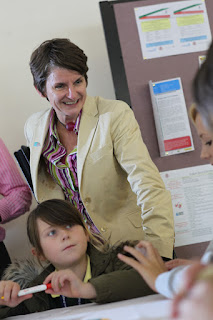Featuring a total of 600 athletes competing for 148 medals, swimming will be the second biggest competition at the London 2012 Paralympic Games.
Huw Griffiths is the National Disability Development Officer for Swim Wales.
Here he talks about competition at the Paralympics and who to look out for.
After the fantastic few weeks of sport we’ve just seen at the Olympics, this is the most anticipated Paralympics Games in history.
At the Aquatics Centre, Wales will have four extremely talented swimmers hoping to produce performances to the sell-out crowds.
Three of them have been to the Games before. Nyree Kindred (2 gold, 4 silver, 3 bronze), Liz Johnson (gold and silver) and Rhiannon Henry (two bronze) bring significant experience to the table. The other is Morgyn Peters, who will be making his Games debut.
All four have been getting access to high quality training. Liz and Rhiannon train at the British performance centre in Manchester, Nyree trains in Leominster with her husband Sasha – himself a multi-medallist in the pool – while Morgyn trains at his Millfield School. Morgyn has also been training with renowned disability coach Billy Pye at the performance centre in Swansea (alongside other Paralympians such as Ellie Simmonds) in the build up to London.
They are now in their final preparation camp in Manchester getting ready for the huge competition.
Being based in Swansea myself, I’ve been lucky enough to see Billy’s squad train and have a chat with Morgyn. He seems in great shape and is really excited about getting to London, as you would expect. Morgan is very quick and certainly a talent. In fact, I think he is one of the most talented young swimmers in the UK.
Swimming will certainly be one of the most hotly contested sports at the Games. In Beijing, 64 countries were represented by competing swimmers, while this time it will be 75. The growth is rapid with so many high-quality squads coming together for the meet.
Countries to look out for will be Brazil, Ukraine, China, Australia and New Zealand. Watch out for Andre Brasil (Esteves) from Brazil, or the Aussie Matt Cowdrey who will compete against Morgyn.
And ParamlympicsGB will be strong too. There’s Ellie Simmonds, of course, and Hannah Russell. For us, it will be people like Rhiannon Henry – who competes with a visual impairment – who will help us show that the disability is no barrier to being able to swim.
I spent some time at Stratford for the Olympics and I must say the park is unbelievably accessible and has been built with the needs of the Paralympics in mind. I’m really looking forward to the opening and closing ceremonies to see the message they give about disability sport and the Games.
The buzz now is huge. Ticket sales for events are massive and I’m sure that the atmosphere will match what we witnessed at the Olympics.
I’m getting enquiries from people all the time asking if I have any spare tickets….but I don’t, they’ve all gone!
We will go into the meet with genuine hopes that our Welsh representatives will compete with the very best in disability swimming.
Follow Swim Wales disability development on Twitter @SWDisability and @SwimWales
When to watch
Rhiannon Henry @Rhi_Henry
S13 50m Freestyle on 1st Septemer
S13 100m Freestyle on 2nd September
SM13 200m Individual Medley on 7th September
S13 100m Freestyle on 2nd September
SM13 200m Individual Medley on 7th September
Liz Johnson @lizjohnson_gb
SM6 200m Individual Medley on 3rd September
SB6 100m Breaststroke on 5th September
SB6 100m Breaststroke on 5th September
Nyree Kindred @nyreekindredGB
S6 100m Backstroke on 30th August
Morgyn Peters @Morgyn_peters
S9 100m Backstroke on 31st August
Classification Information
Swimmers are classified according to how their impairment affects their ability to perform each stroke.
Classes are:
1–10: athletes with physical impairments. Class 1 swimmers’ impairment has the greatest impact on their ability to perform strokes; class 10 swimmers’ has the least impact.
11–13: athletes with a visual impairment. Class 11 swimmers have little or no sight; class 13 swimmers have limited sight.
14: athletes with an intellectual impairment compete in class 14.
Classes are:
1–10: athletes with physical impairments. Class 1 swimmers’ impairment has the greatest impact on their ability to perform strokes; class 10 swimmers’ has the least impact.
11–13: athletes with a visual impairment. Class 11 swimmers have little or no sight; class 13 swimmers have limited sight.
14: athletes with an intellectual impairment compete in class 14.
Breaststroke uses greater leg propulsion than any other stroke, therefore athletes with a physical impairment often have a different class for this event compared to Freestyle, Backstroke and Butterfly.
This is also taken into account when athletes compete in the Individual Medley. This is shown by a prefix:
S before the class represents Freestyle, Backstroke and Butterfly events.
SB before the class represents Breaststroke events.
SM before the class represents Individual Medley events.
S before the class represents Freestyle, Backstroke and Butterfly events.
SB before the class represents Breaststroke events.
SM before the class represents Individual Medley events.
.jpg)


















